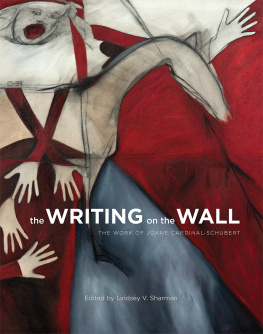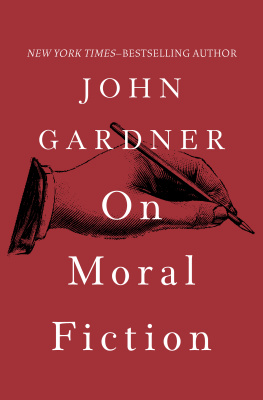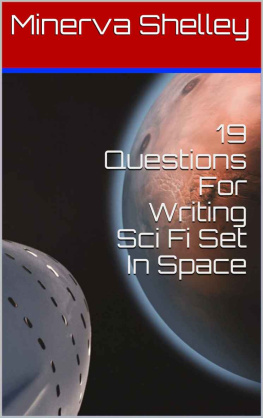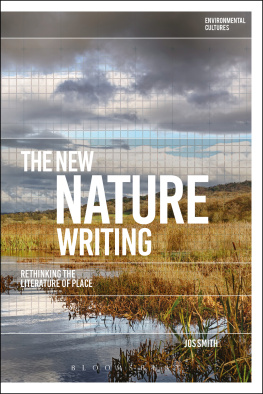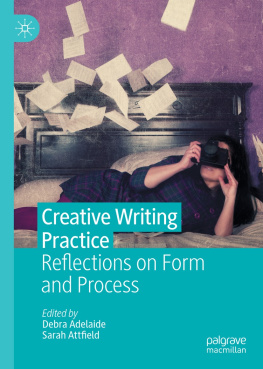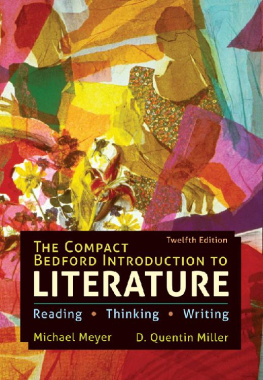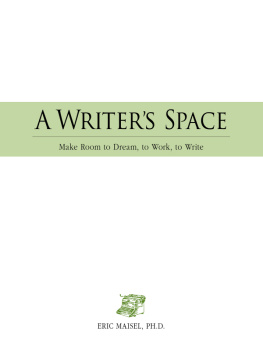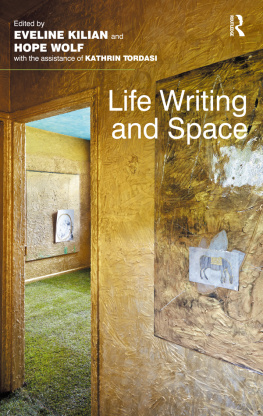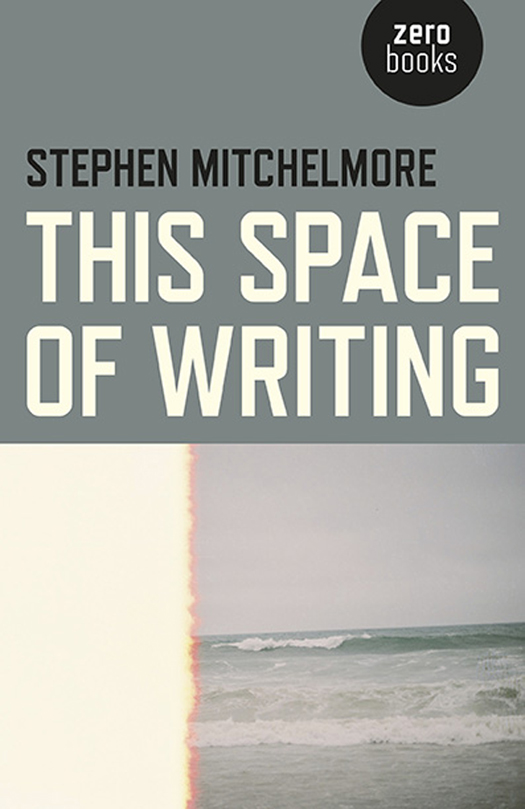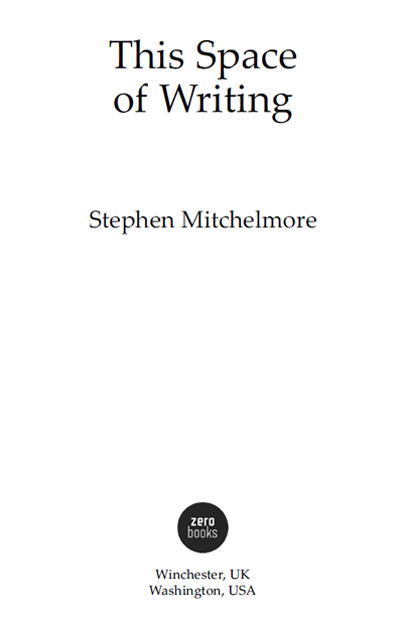WHAT PEOPLE ARE SAYING ABOUT
THIS SPACE OF WRITING
Stephen Mitchelmore has, over the years, in his blog, This Space, shown himself to be one of the acutest critics of contemporary writing anywhere. I do not always agree with him, but his work always makes me think and often helps me to understand.
Gabriel Josipovici, author and critic
For many years, Steve Mitchelmore has been a source of both inspiration and envy: introducing me not only to new writers but also to new ways of thinking.
John Self, blogger at The Asylum
It would be fulsome praise indeed to announce that This Space contains some of the very best writing in the literary blogosphere, but it would be more true to say that it contains some of the very finest writing on literature Ive ever read anywhere.
Mark Thwaite, Head of Online at Foyles and editor of Ready Steady Book
This Space of Writing is such a lovely, luminous thing in my reading life.
Jen Craig, author of Panthers and the Museum of Fire
Ive been an avid reader of Stephen Mitchelmores posts on This Space for well over a decade. He not only shows us what to read, but new ways to read. His insights and analysis always leave me inspired. This new collection is a reason to celebrate.
Todd Colby, author of Splash State
Stephen Mitchelmore is of the best minds of my generation and an inspiration.
Lee Rourke, author of The Canal
Stephen Mitchelmore was the first literary-critical blogger, and has remained the best. His blog, This Space, ten years in existence, and commanding a wide readership, contains exquisite long-form meditations on literary fiction of the kind only the blogosphere can allow. Gathered here, Mitchemores essays show a cumulative power, developing a philosophy of literature in a manner that recalls Blanchots The Space of Literature.
Lars Iyer, author of Spurious and Wittgenstein Jr
First published by Zero Books, 2015
Zero Books is an imprint of John Hunt Publishing Ltd., Laurel House, Station Approach,
Alresford, Hants, SO24 9JH, UK
www.johnhuntpublishing.com
www.zero-books.net
For distributor details and how to order please visit the Ordering section on our website.
Text copyright: Stephen Mitchelmore 2014
ISBN: 978 1 78279 980 1
Library of Congress Control Number: 2015943104
All rights reserved. Except for brief quotations in critical articles or reviews, no part of this book may be reproduced in any manner without prior written permission from the publishers.
The rights of Stephen Mitchelmore as author have been asserted in accordance with the Copyright, Designs and Patents Act 1988.
A CIP catalogue record for this book is available from the British Library.
Design: Stuart Davies
Printed and bound by CPI Group (UK) Ltd, Croydon, CR0 4YY, UK
We operate a distinctive and ethical publishing philosophy in all areas of our business, from our global network of authors to production and worldwide distribution.
Something Less (or More) than Literature
An Introduction by Lars Iyer
Ten years ago, on his blog This Space, Stephen Mitchelmore quoted Adam Phillipss celebration of the marginality of poetry in Britain: Its freeing people actually to be able to work their own way. People are only going to be poets now if they really want to be. Theres no money in it and very little glamour.
But it is not just poetry that is marginal in Britain; literature itself now occupies that position shut out by multinational publishing conglomerates, by the near-disappearance of maverick publishers and magazines in which to showcase innovative work, and by a secure and complacent press. But then, as Phillips says, being shut out might be liberating too.
Granted, there remains a whole infrastructure to help the literary writer make sense of their endeavour: reviews, profiles and interviews in the broadsheets and, for the fortunate, lucrative publishing deals and well-attended launches. Not only that, new courses of study in creative writing are increasingly popular, leading to teaching positions and visiting professorships; there is a proliferation of literary festivals and literary prizes; and authors rooms are photographed for the newspaper. And, in a time of the declining prestige of literature and the decimation of the earnings of writers, who would begrudge authors the chance to meet admirers at literary festivals, or to find reassurance in their profiles and interviews, or to backslap writer-comrades in the review pages and to be backslapped in their turn? Who would be so churlish as to deny that teaching creative writing is a great way to get by in these difficult times?
Yet this supportive infrastructure, which continues to makes sense of literary writing, tends to reward a certain kind of book if it is not a money-spinner, written for marketers projections of the common reader, then it must appeal to the judging panels of literary prizes, the contemporary arbiters of good taste. Prize panels typically favour ostensibly serious and profound books, and are suspicious of what they suspect to be pretension the heavy hand is in; the light touch, out. Hence the triumph of clunky middlebrow narratives, as technically accomplished as they are paranoiacally uptight, guarding themselves from doubt, from openness through writerly accomplishment and through the cynicism and irony that are the mainstay of our times. This quintessentially British literary good taste is one of Steves great bugbears, being sure of itself to the point of smugness, and hardly so much as aware of the existence of other literary traditions, of literary works in translation, and of its own homegrown radicals.
It is therefore only by proceeding in the opposite direction to the literary market that the writer might discover an element of freedom. The problem is that such freedom is difficult, subjecting the author to the uncertainty so effectively disposed of by good taste. The abandonment of the middlebrow gold standard of literary work is to be exposed to the predicament that has faced every genuine writer since Romanticism, who must work without the safeguard of a tradition and therefore without a model of what literary writing should look like. Last years words belong to last years language / And next years words await another voice (T.S. Eliot). And it is not enough to shake off a whole order of good literary habits and good literary manners to find another voice. The real challenge is to transform the freedom-from established norms and traditional securities into a freedom-to make it new.
In Whatever Happened to Modernism? a book that is a touchstone for Steve, and the subject of one of his richest essays (included below) writer and critic Gabriel Josipovici assembles a counter-history of literary figures for whom received ways of writing were inadequate to their needs, figures who felt called to write but had to struggle to discover how they might respond to this call. Told backwards, with the emphasis on what they achieved subsequently, the careers of Kafka, Proust or Mann writers so important to Steve can seem all too monumental. As Josipovici reminds us, however, these figures lived their writing


